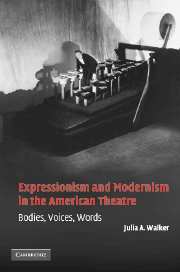Book contents
- Frontmatter
- Contents
- List of illustrations
- Acknowledgments
- Part I Introduction
- Part II Introduction
- 4 The “unconscious autobiography” of Eugene O'Neill
- 5 Elmer Rice and the cinematic imagination
- 6 “I love a parade!”: John Howard Lawson's minstrel burlesque of the American Dream
- 7 Sophie Treadwell's “pretty hands”
- Epilogue: “modern times”
- Notes
- Works cited
- Index
4 - The “unconscious autobiography” of Eugene O'Neill
Published online by Cambridge University Press: 22 September 2009
- Frontmatter
- Contents
- List of illustrations
- Acknowledgments
- Part I Introduction
- Part II Introduction
- 4 The “unconscious autobiography” of Eugene O'Neill
- 5 Elmer Rice and the cinematic imagination
- 6 “I love a parade!”: John Howard Lawson's minstrel burlesque of the American Dream
- 7 Sophie Treadwell's “pretty hands”
- Epilogue: “modern times”
- Notes
- Works cited
- Index
Summary
Jamie o'neill, eugene's dissolute older brother, often played minor roles in The Count of Monte Cristo alongside his father, actor James O'Neill, whose performance in the title role earned him a considerable fortune and made him a star. While James was the consummate professional, who early in his career caught the favorable attention of Joseph Jefferson and Edwin Booth, Jamie was anything but. Scornful of his father's success and contemptuous of his bravado – both on-stage and off – Jamie frequently used his stage appearances as opportunities to embarrass his father. On one occasion Jamie took to striking poses upon the apron of the stage while dressed in leggings tight enough to reveal his most intimate proportions. But it was neither the posturing nor the leggings that embarrassed the elder O'Neill. Accustomed to such tricks himself, James condoned the leggings since they were likely to please the ladies in the audience. What mortified him was the fact that Jamie made explicit eye-contact not with the “ladies” but with the prostitutes whom he already knew well (Gelb 107).
If Jamie's antics were meant to be outrageous, it was not because they included a public recognition of prostitutes, but because they made explicit the unspoken relationship between theatrical and social codes of propriety. For Jamie knew (as perhaps his father did not) that, by the early twentieth century, his father's melodramatic style of acting had become associated with theatres catering to lower-middle- and working-class audiences.
- Type
- Chapter
- Information
- Expressionism and Modernism in the American TheatreBodies, Voices, Words, pp. 123 - 154Publisher: Cambridge University PressPrint publication year: 2005



